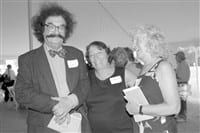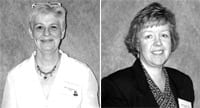Myths About Cancer, Nutrition
As a nutrition counselor, Dr. Nancy Dell knows that Americans in general — and cancer patients specifically — are looking for advice on what foods and supplements will keep them healthy.
Unfortunately, much of the information floating around in the media and on the Internet is unsubstantiated, incomplete, and even contradictory.
Dell, who operates a nutrition counseling practice, Nancy Dell & Associates, and also works as a nutrition and health reporter for WWLP-TV22, tried to bring a little clarity to the issue in a recent lecture at Mercy Medical Center, “Nutrition for Cancer Patients: Separating Science from Myth.”
“Approximately 9 million people in the U.S., roughly three in every 100, have survived cancer, and many of them look to nutrition — eating specific foods and taking specific supplements — to prevent future illness, and there’s a ton of information out there,” Dell told The Healthcare News shortly before the program.
Especially when dealing with cancer patients, she said, no two people are alike and require the exact same advice. But there are some general rules to live by when it comes to nutrition — and some definite misconceptions.
Information, Please
One mistake common to many cancer patients is failure to make a connection between habits that help prevent cancer and those that might stave off a reoccurrence. Excess weight is a perfect example, she said.
“Researchers know that carrying too much extra weight can increase the cancer risk in the first place, but excess weight also increases the chance of a revival after certain cancers,” she said. “We know a lot about what to do to prevent cancer, but nobody really looks at what we do to prevent a reoccurrence.”
What makes that concept even trickier is the fact that certain specific dietary rules that apply to cancer prevention, in fact, have the opposite effect on people who have already survived a cancerous episode. Eating soy products is one example.
“The whole idea of taking soy is controversial if you’ve already had cancer,” she said. “It contains plant estrogens that have been shown to help to prevent a first prostate or breast cancer. And when you’re a prostate cancer survivor, soy still seems to be helpful.
“However,” she continued, “if you’ve had breast cancer, reports from Harvard Medical School and the National Institutes of Health find that, for women who have had endometrial cancer or breast cancer, substances in soy can actually promote the development of cancer. So there are two different stories there.” Flax seed has a similar dual nature, she added.
Vitamin and mineral supplements are popular nutritional aids, Dell said, but, again, consumers don’t have all the facts. One study, for instance, suggests that a beta carotene supplement can actually increase the risk of lung cancer. Furthermore, medical professionals have never been totally convinced that removing a property from food and repackaging it as a supplement has the same effect as simply eating the food itself.
“When you bite into a tomato, you get 10,000 components of the tomato, and we don’t know what 99{06cf2b9696b159f874511d23dbc893eb1ac83014175ed30550cfff22781411e5} of those do,” she said. “We do know, however, that some components in food work together to decrease the risk of cancer, and if you pull a supplement out, it might not have the same effect — and it might have the opposite effect sometimes.”
Then there’s the question of eating meat, which is a staple of many lifestyles — including the popular Atkins diet. According to the National Institutes for Cancer Research, Dell said, about 30{06cf2b9696b159f874511d23dbc893eb1ac83014175ed30550cfff22781411e5} of cancers are diet-related, and cancer cases in the U.S. could drop by 30{06cf2b9696b159f874511d23dbc893eb1ac83014175ed30550cfff22781411e5} to 40{06cf2b9696b159f874511d23dbc893eb1ac83014175ed30550cfff22781411e5} if everyone turned to a primarily plant-based diet.
“Studies show that people who have a diet high in red meat and processed meat have four times the risk of esophagal cancer and double the risk of stomach cancer as opposed to those who eat a plant-based diet,” she said. That’s partly due to the natural vitamins present in fruits and vegetables, but also because of the high levels of saturated fat in meat, as well as the carcinogens that form during the cooking process. You don’t want charred food. It gives you the same effect as smoking cigarettes.”
A Women’s Health Institute study of 20,000 nurses backs up the perception of saturated fat as dangerous. In just four years of that study, women who ate 23 or more grams of saturated fat per day doubled their cancer risk.
But even eating a vegetarian diet raises questions, one of which has to do with the pesticides sprayed on some plants. While many people swear by an all-organic diet, Dell said most pesticides are totally removed by thorough washing. “Some people just throw them under water and rinse them off. You do need to wash produce well.”
Alcohol is another area where people have been confused about benefits and drawbacks, but new research has taken away some of the uncertainty, Dell said.
“A lot of people think consuming alcohol at dinner is helpful in preventing heart disease, but women who drink alcohol have an increased risk of breast cancer,” she said. “Only in the last few months have researchers found that you can reduce your risk of breast cancer to the level of non-drinkers if you get enough folic acid from food or multi-vitamins.”
As a rule she said, one drink a day for women and two for most men — a drink being 12 ounces of beer, four ounces of wine, or one ounce of hard liquor — is an acceptable limit.
Everyone’s Different
Since launching her practice — which now has locations in Feeding Hills and East Longmeadow and reaches into eight area physician practices — Dell has backed off her old schedule of multiple lectures a week, although she still makes occasional speaking dates like the one at Mercy. There, even while delivering copious amounts of information, she admitted that there’s only so much she can do to help individual members of the audience because everyone’s makeup is different.
“There’s so much to talk about, but it does vary with the individual,” she said. “Soy might be good, but for me personally, I have a soy allergy.
“The information is general information, and what’s important for you as an individual needs to be discussed with your doctor and personal dietitian. Your information will vary based on your health history, the medications you take, and your lifestyle. It really does depend on a lot of things.”
Some of those differences are outlined in a book Dell recommends, Dietary Options for Cancer Survivors, which is available on the American Institute of Cancer Research Web site, www.aicr.org, or by calling (800) 843-8114.
Much of what Dell tells people is common sense, but sometimes they need a little clarification of what they think they know. She spoke of one woman who gained six pounds while relying on nuts as a snack.
“She heard about how nuts are good for you,” Dell said. “Yes, but two tablespoons, not the whole can!”



Comments are closed.